#all. lothar
Explore tagged Tumblr posts
Text




It felt…karmic that he’d lose them and there would be nothing he could do to save them.
@lotharx & @alrikhart & @alessiathepath
9 notes
·
View notes
Text
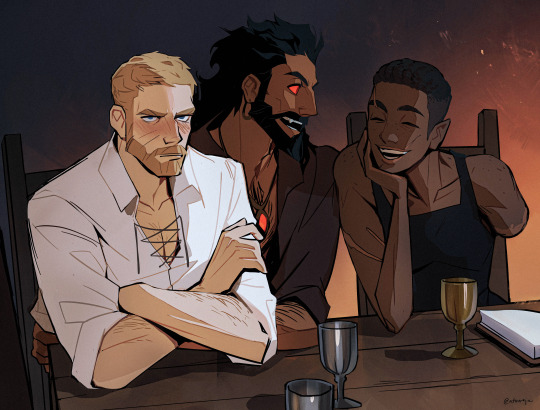
i NEEEED wrathion to return!! i need to see these 3 interact!!!!!
#my art#world of warcraft#quit ff to play wow again and now i'm taking a break from wow to play warframe but nothing will stop me from posting wranduin#wranduin#anduin wrynn#wrathion#faerin lothar#guys i'm so dedicated to drawing the cutest faerins of all time
987 notes
·
View notes
Text

Amongst the things Prospero could have expected in his life, this was not one of them. When he had gone through the Arches and come out, it had felt like he lost everything. The family he had and the family he had formed had been lost to him in what felt like the blink of an eye. Never would he have expected to get even one of those things back. It had been at the cost of his soul, but he had been okay with that. He would suffer if it meant he could have at least one of those things in his life to care for. The druid had been...lost. He'd been wandering aimlessly for several years before he had gotten to Iskaldrik. A blessing and a curse, he guessed. Nevertheless, he wasn't going to look back on the past when the present could slip away from him just as fast. He couldn't let that happen. He wouldn't.
There was one other thing he hadn't expected and that was the soft nature in which he was hugged back. From the length of time they had known each other, he hadn't known the other to be that way. He was all harsh lines and blunt words whenever they spoke. Prospero had grown used to it. He actually liked it on the brute where he probably normally wouldn't. There was no part of him that wanted to let go of this hug for that reason alone. Who knew when he would get this again? They couldn't stay like this forever though. After a few minutes, he pulled away from the hug enough that his arms were at his sides, but he didn't step away. He couldn't find it in himself to put any space between them. "I see you, too, you know." Prospero didn't look away from Lothar's eyes as he spoke. His hands lifted back up to rest on the sides of the other's neck. "You...you're my safe space. Let me be yours, too."

Lothar couldn't say he'd ever known Prospero to be quiet, this sad rumination settling over the other like a tenebrous, unyielding cloud. Such feeling shrouded them like an omen, something yet to pass, and maybe if Lothar was wiser he'd turn away from any such thing that felt eclipsed with a saturation of pure dark but the crux of the matter was that the barbarian tended to gravitate towards these with ease. He'd chased such shadows his entire life, hunting apparitions and shades as though Lothar could revert time and prevent the crucial moment which set him on this path. The Wheel weaves, it's what a certain runic knight repeated to Lothar several times since meeting him, and standing here in Prospero's doorway, Lothar realized he didn't have to keep chasing something that proved ceaseless.
Iniquity, evil, it was an endless cycle, but the barbarian could fight it from one place if he willed it so; he'd the power of the giants in his blood, the heart of a Red Hand, he could pause, even if for a moment. Still, even a barbarian could squeak out a sound of surprise, rigid muscles meeting the embrace before they softened and wound around the other in inevitable acceptance. Lothar wasn't used to such softness, even if it was surely meant to salve the other's emotional wounds, but it stunted him all the same. Eventually, even bordering on a touch dumbfounded, Lothar said, "Okay."
6 notes
·
View notes
Text
One of my favorite moments in the Warcraft movie is when Lothar checks the passed out orc and both him and the audience get an up close view of just how massive orcs are compared to humans. Sure, we already knew that orcs are big and strong but seeing it up close is an amazing visual to me. Like are you kidding me?? Lothar can't fully wrap his hand around ONE orc finger. ONE FINGER. The size difference is blowing my mind.

#gnawing at the bars of my enclosure#I’m so not normal about this#this movie is giving me way too many ideas#I love this movie I don’t care what anyone else thinks#and let me repeat it for the millionth time#I fucking love orcs#the size difference is CRAZY#absolutely wild#also is it weird that I want to paint his nails lmao#their hands are so big#i’m going insane#Lothar can’t handle all that lol#warcraft 2016#warcraft#Warcraft the beginning#orc#orcs#orc x reader#orc fucker#monster fucker#teratophillia#size difference#monster x reader#monster x human
185 notes
·
View notes
Text



I just want them all to hang out so badly ok
#warcraft#world of warcraft#faerin lothar#anduin wrynn#wrathion#blizzard can u hear meeee#WHEN ARE THEY ALL GONNA HANG OUT WHEN???#anduin needs to introduce his gf to his bf LETS GET ON IT#is there a poly ship name for them yet#or do i have to do everything myself lmao#stay tuned for some ot3 pics of them i have ideas#my art#blender render#3d render#digital art
44 notes
·
View notes
Text
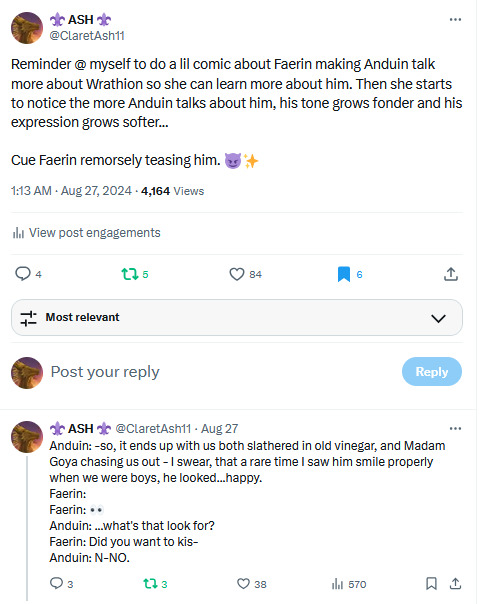

I don't often share my WIPs to tumblr, but I just had to share my thoughts here! 👀
Faerin would COMPLETELY be the type of friend to tease Anduin over his unusually focused, but soft tone whenever he talks about this mysterious "Wrathion". She's determined to meet this dragon who Anduin seems to have so many stories about... so that she has two future teasing targets! 😈✨
#World of Warcraft#Anduin#Faerin Lothar#Wrathion#wranduin#PLEASE LET THEM ALL BE LOVING BFFs TO EACH OTHER I'M DYING IN WoW'S HARSH MOSTLY FRIENDLESS ENVIRONMENT 😭💕💗💕💗💕💗
88 notes
·
View notes
Text
I recently read "The Last Guardian" and I am absolutely delighted by it, I feel like when it comes to Khadgar content this is a huge "must read" because the whole book is just so good-natured despite the fact that this sets off a never-ending series of deeply traumatizing events for Khadgar.
Here's some things that canonically happen in this book and that I just found so endearing or fun:
The Kirin Tor literally sends Khadgar off to Medivh because Khadgar kept wandering the halls of the Violet Citadel at night and being so nosy that he caught his professors on drinking binges, sleeping with students or trying to summon demons. Medivh knows that they sent him here hoping he dies because he knows too much.
Khadgar rambling and babbling and being delightfully awkward
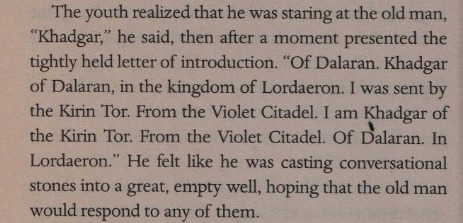
Khadgar forgets how to talk when he meets Medivh and makes some strange sound to which Medivh asks Moroes if "the lad is ill."
Medivh having scheduled times for breakfast, lunch and dinner and keeping to them. Also he and Khadgar are just eating porridge with sausages for breakfast every day when he is around.
Khadgar having his inscription set with him that he carries all neatly packaged and tidied up, even though he is this scruffy dirty looking teen boy.
Lothar and Medivh both have this dad relationship with Khadgar, but Lothar is like the cool supportive dad who would take you to a soccer game and would support you at pride with the wrong flag.
During this particularly deep conversation about time and space, Medivh encourages Khadgar to have a bit of wine, Khadgar gets a little tipsy and then Medivh encourages Khadgar to live a little and try to levitate e mug with his magic even though he has been drinking - naturally it ends with Khadgar cleaning the floor afterwards.
When Medivh falls into a coma after their demon encounter at Stormwind, he entrusts Khadgar with handling his mail and Khadgar spends most of his free time sitting next to Medivh's bed and reading him the mail - especially the funny parts.
In the same situation when Medivh wakes up, he sees the startled Khadgar on the floor (after a vision of Sargeras) and softly asks him why he didn't ask Moroes to set up a bed for him there if he wanted to stay in his room.
Khadgar goes very quickly from "Guardian! There is an ORC in the tower!!!" to "Garona is my friend :)"
Khadgar and Garona spend a lot of time rebuilding the library after Garon thrashes the place in order to save Khadgar's life. They make a makeshift woodwork station in the stables outside Karazhan.
Khadgar has like a lowkey puppy crush on Garona and this is actually innocently cute.
Khadgar and Garona on the road when they flee from Medivh is such a nice sequence because they protect each other (from the orcs and humans who would hurt the other one) and also about the fact that they feel betrayed by Medivh. Also Khadgar just wants her to like and trust him 😭

Lothar gets Garona to wear the Stormwind armor by telling her that it matches her eyes and that Khadgar will wear it - and then Khadgar also tells her it matches her eyes and she looks good in it. Lothar using elementary school level tactics to get them to wear the Stormwind armor is so funny.
I just feel like this book was really fun and the pacing of the story was great between building up Medivh as an antagonist who genuinely cared for Khadgar, solving the murder-mystery around him and had the right amount of just daily domestic stuff between Khadgar and him and Khadgar and Garona. Not to mention the excellent parallels between Medivh losing his youth and waking up as an old man and Khadgar losing his youth while also going through what is a very sad coming of age story for him.
#world of warcraft#khadgar#medivh#the last guardian#garona halforcen#the warcraft film really threw the ball here with their adaptation bc they took out all that made this part of the lore so heartfelt#like these chars care so much for each other and none of that made it in the warcraft film#also a lot was stolen from khadgar and given to lothar and medivh like his plot with garona is SO good#also bisexual khadgar is real btw my uncle works at blizzard
121 notes
·
View notes
Text
Since the moment Faerin Lothar was datamined i've seen alot of 'OoHh aNDUIN'S FUTURE WIFE????' and as annoying as that is you know what?? Ill accept it if he takes her last name.
#Anduin stealing Anduin Lothar's full name would be fucking hilarious#anyway i don tknow anything about her but her taelia and tess should all go make out or something#why is Anduin always paired with lesbians
61 notes
·
View notes
Note
will valentin and mc's relationship even be fixed after she finds out? what will he do if she won't take him back lmao 💀 i hope he apologises or something, probably not...
can't say for sure right now because i'm reworking the entire plot, but obviously he has to regret his actions and beg for forgiveness, but i think i'll give mc the chance to accept it or not. maybe fuck val over by picking lothar to ne extra petty 🤪
#an absinthian ballad#aab valentin#aab lothar#talk about jumping out of the frying pan and into the fire holy shit that's a terrible choice to give#but it is petty af and that's all that matters#god i love writing wife-chasing crematoriums#is val the only one i have though? i don't think vezian counts#maybe qls in a way lol
10 notes
·
View notes
Text
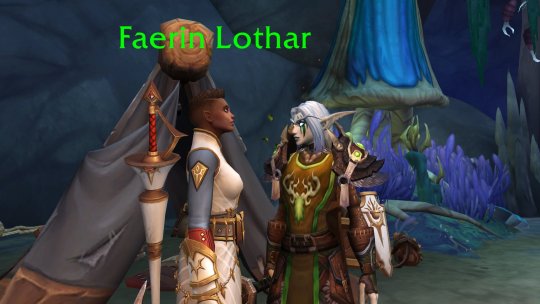
this is insane the female night elf model is 7ft even, are u telling me faerin is 7ft+
#yeah yeah we all know they scale them up but we've never seen her not scaled up we dont know her actual height lmao#faerin lothar#faerin#world of warcraft#the war within#tww spoilers#tww#warcraft#blizzard
12 notes
·
View notes
Text
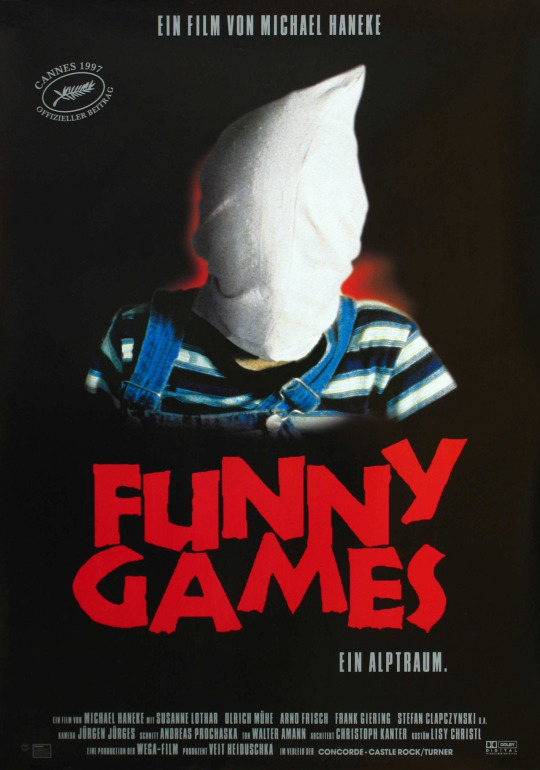
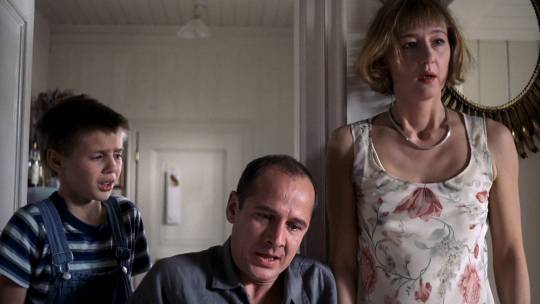
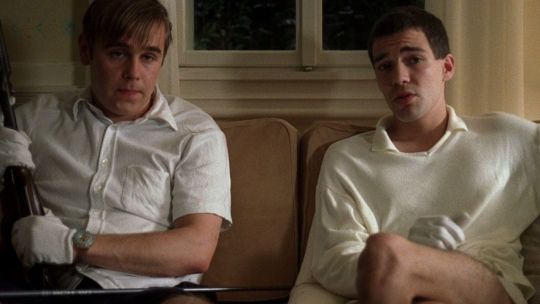
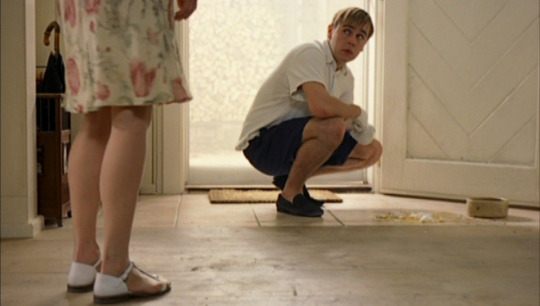
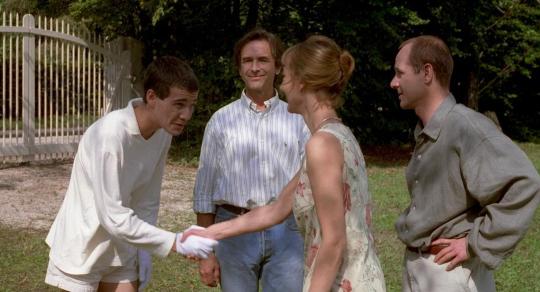
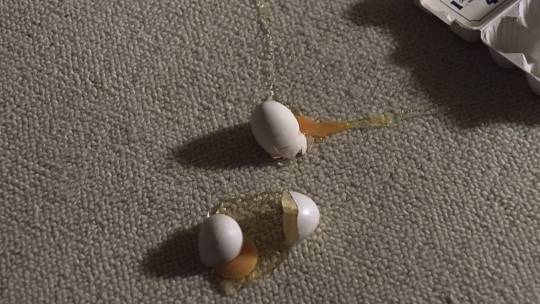
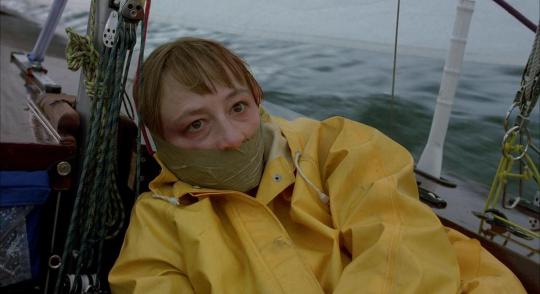
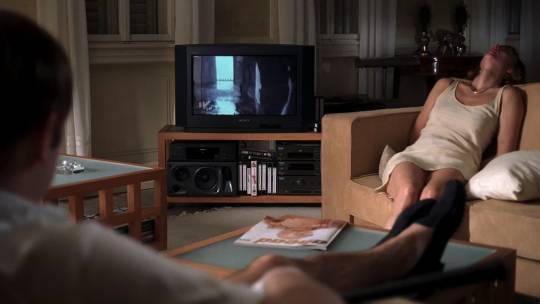
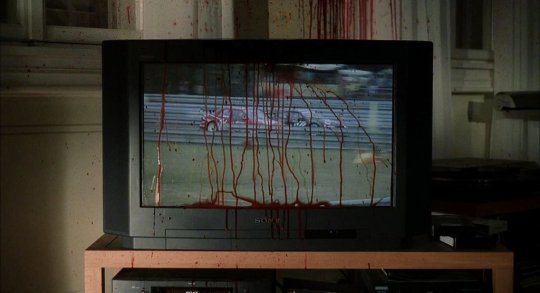
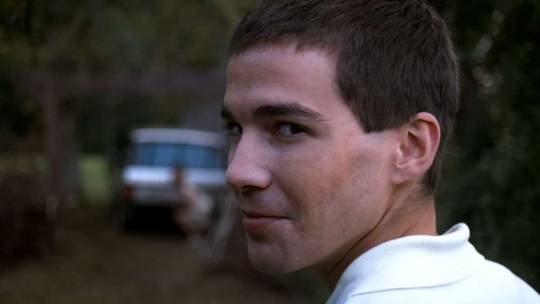
Funny Games (1997)
"Why are you doing this to us?"
"Why not?"
#funny games#1997#austrian cinema#horror imagery#blood tw#michael haneke#susanne lothar#ulrich mühe#arno frisch#frank giering#stefan clapczynski#doris kunstmann#christoph bantzer#wolfgang glück#susanne meneghel#monika von zallinger#although it's been on my to watch list for a long long time‚ this is also exactly the kind of film that I'd never take any particular#effort towards finding‚ content to spend years saying 'oh yeah i really should watch that'. so I'm most grateful to @bimbobussy for taking#the initiative and providing me with a copy; years and years of interest in film and in horror have meant that i was more than familiar#with the plot‚ the layout‚ the fourth wall breaks‚ and that might have been something subconsciously putting me off getting round to this#but im really glad i did. what an experience. my prior knowledge didn't feel like a hinderence; instead it leant an awful expectation to#the earlier scenes‚ allowed for dreadful recognition of what was coming. and i still got played! the misdirection with the knife‚ dropped#in an early scene‚ the planting of a seed of an idea that's there just to be subverted‚ a blackly comic bit of sleight of hand.#Haneke fills the film with such subversions: it's in the 4th wall breaks‚ the first of which is brief and subtle enough to go nearly#unnoticed‚ but which build in defiance of audience expectation to become outright challenges to the viewer‚ a kind of accusation of#complicity in the horrors unfolding; and then again‚ those horrors: Haneke actually keeps most of the violence offscreen and for all its#reputation for shocking horror‚ you actually see very little; except for the aftermath of that violence‚ which we do see‚ which we're left#to sit with for an uncomfortably long time‚ another accusation perhaps‚ or simply acknowledgement that the worst can sometimes be for those#left behind‚ the witnesses and the mourners. something very like genius at work here‚ a troubling masterpiece on violence and its impact
10 notes
·
View notes
Text
closed starter for @lotharx location: lostlands note: :angrytiddies:

Tired was the word he would use for how he felt right now after everything that had transpired. Prospero had never really been through a fight quite like that one before, but he had to say that facing down a dragon and speaking with some deities was not on his bucket list. Maybe he should have put those things on there though. That seemed to be the least of their concerns now. He should've been with Alrik and Alessia right now. Instead, he was here looking at this barrier. This wasn't magic he had ever seen himself, but he'd read about it. Seven layers of elemental and spiritual magic formed this prismatic barrier surrounding Iskaldrik. It would take precise movements to even make a dent in it. And he may have been old, but this was not something that one person could do alone.
Nevertheless, he had been on his way back from observing it only to run into his future date. He still wasn't sure if they were actually going to go on that date or if it had been a joke, but he'd keep pretending that it was the former. There was a question lingering in his mind though. "And here I thought you were a normal, stoic soldier with an ax. Little did I know you were sipping colossus juice."
13 notes
·
View notes
Text
#sorry guys polls dont allow all the heirs :(#asoiaf#a song of ice and fire#house frey#elmar frey#big walder frey#aenys frey#black walder frey#lothar frey#danwell frey#edwyn frey#hosteen frey#lyonel frey#aegon frey#sorry if any of the options are actually already dead#im trying man#this is really the most important question before winds tho
2 notes
·
View notes
Text

Save was one hell of a word. Prospero wasn't really sure that he could save anyone. He would try though. He'd made that promise and all that so he damn well had to now. Not that he'd needed to make a promise to want to save either Alessia or Alrik. Still, it was good that the words were out there in the open. Alessia had made him sware and so had Alrik. The druid never went back on his word. Not even with devils.
That was why they had gotten into this mess in the first place, wasn't it? All of this was his fault. Maybe some other Darkfriend could've caused that night at Nornwatch, but they hadn't. It had been him that the Dark One had taken a hold of. He wanted to remember everything he had done, but it felt like he had only come up empty. There was no way he could take back what he had done and there was no memory of what had happened before. Dwelling on it would only keep making the burden that much heavier and he had to focus on finding and saving Alessia. That was his priority.
"Her name is Alessia. She told me to make sure her brother makes it to Lysara and I told her that they both would. I don't ever go back on my word." He paused. "So I will find her and bring them both to Lysara. Let's hope we're both still alive for a date, yeah?"

Lothar was practically called to attention when Prospero mentioned he'd someone to save; Prospero still couldn't look the barbarian in the eyes, but that truth had splintered something away, opened a vestige that Prospero seemed keen to hide under lock and key. It wasn't as though Lothar was known around the world for his ability to hold a conversation, but he'd learned when to muster up enough of a sentence to nudge another in the right direction.
His steady gaze remained on Prospero, arms crossed, "Who are we to save then?" Another nudge but his inquiry was casual, there was no insidious curiosity; Lothar merely wanted to let the other know that if he was to need assistance, the Ax would be there. It was as simple as that; he needn't cash in on baseless flirtations to represent his own dedication to the cause of saving others, but it also didn't hurt to extend himself in that regard.
"Save her, travel the rest of the way, then a date - it sounds easy enough," a smug expression overcame Lothar's normally unreadable countenance, but the warrior knew that their difficulties were only just beginning.
11 notes
·
View notes
Text
On a scale of 1-10, how much would it hurt Wranduin shippers if Anduin turned up to the Dragon Isles and immediately started putting the moves on Sabellian?
#honestly the real 'anduin x old man' pairing is anduin x khadgar#specifically because khadgar is like the only older alliance male who ISN'T a weird father figure for andikins#except i ship khadgar x lothar all day every day and like#that's just way too sad#like oh yes#hello young man named after my old lover and his best friend#child whose entire existence is basically a memorial to how fucked up things got in my absense#how futile most of the sacrifices of my friends were#and a bunch of other really sad stuff#character babble#anduin wrynn#khadgar#sabellian
10 notes
·
View notes
Text

SOMETHING THERE (Caged Warcraft Orc/Reader)
Summary: Orcs have invaded your world and you're tasked with taking care of a very angry, very injured imprisoned orc. But he's not the only one that's going to be taken care of.
Author’s Note: Hello, lovelies! A little while ago I got sent an ask here about the captured orc in the movie Warcraft (you can read the post here). I love the concept so much that I just had to write about him. He's unnamed in the movie so I just refer to him as an orc throughout this. This can be read as a generic orc x human story but just know this was written specifically with this big drooling guy in mind. Hope you enjoy!
Warnings/tags: 18+ MDNI, fem! reader, orc x human, canon divergent, smut with some plot, teratophillia/monsterfucking, injured character, conversation about mates, teasing, size difference (this orc is bigger than you no matter your size), let's pretend that Warcraft orcs would actually fit for a moment, fingering, standing sex, rough sex, unprotected p in v, some degradation, possessiveness, he's mean I don't know what else to tell you, choking, hair pulling, semi public sex (?), Lothar makes an appearance, no aftercare, NOT beta read
Word count: 4.7k

Your job had been straightforward for the most part. You were a handmaiden often tasked with cleaning and maintaining the kingdom's dungeons. There had never been many prisoners kept in the lower parts of the castle, not while you had been of service there at least. Most of the time the cells were empty and you were often tasked with taking care of other parts of the castle instead, places frequently overlooked by the other maids.
But all of a sudden you found yourself busier than usual when a handful of knights dragged in a nearly dead creature of the likes you had never seen before. It took multiple men to pull him down the steps of the dungeons and into a barred cell.
Lothar, a man you had become friends with, followed behind his fellow knights, watching as they hovered around the prisoner.
“What exactly is he?” you asked quietly.
You had met all types of denizens of Azeroth. Elves, dwarves, worgen….but never anyone like the large, tusked man that laid before you.
Lothar shrugged, not knowing the answer to the question.
“If I knew I would tell you. They just…showed up. I don’t know where they came from. Or how many there are. We took the other one to the king for questioning. She’s tiny compared to the rest of them,” he mumbled.
You looked down at the floor, staring at the smeared trail of blood leading from the stairs to the cell.
“He’s wounded?” you questioned, looking back at the cell.
“Yes, he was going to attack the other one we captured. Can you keep him alive?” Lothar asked.
You nodded. You had cared for injured and sick prisoners before. Some of them probably wouldn’t have lived if it wasn’t for you.
“I’ll need supplies though.”
“I’ll get you everything you need. Just be careful and try to keep your distance as much as possible. He doesn’t seem to be the friendliest,” he said.
Lothar left you with the other knights, disappearing up the stairs. After a few minutes, he returned with a box of supplies, far more than enough to heal any wounds. He ushered the other knights out and wished you luck as he sauntered away.
You had unlocked the cell and spent a considerable amount of time trying to remove the rugged bone armor and leather from the sleeping creature's chest. You then began cleaning and stitching the stab wound, silently cursing Lothar for creating such a nasty wound to begin with. Never once did the being move or wake. His breathing was weak and a part of you thought he might die right then and there from the amount of blood he had lost.
But his chest continued to rise and fall as you snipped the end of the stitches with your shears. A sigh of relief escaped your lips as you sat there for a moment, watching the sleeping creature.
He was large, bigger than any human you had ever seen. He had long greying hair and an untamed beard. Although his eyes were closed you could tell that one had been previously injured, the skin around it scarred and almost red. On the opposite side of his face, a deep scar ran from his lip up the side of his face. There were pieces of metal embedded in the skin where the wound had been closed and healed over the metal.
There was a part of you, deep inside your mind that found the rugged stranger quite attractive. But you ignored that part of your mind, pushing those thoughts aside. You knew nothing about the being that laid before you and you weren’t going to let curiosity get the better of you.
You wrapped a bandage around his shoulder and chest, something that proved to be quite difficult with how large he was. But you managed to do it regardless, securing the bandage so it wouldn’t move.
You stood up and walked out of the cell, closing the door behind you.
There was still blood all over the floor and you quickly turned your attention to that, scrubbing the floors by hand, something you had done time and time again.
About an hour passed and as you found yourself on your knees, scrubbing the last bit of blood off the floor you heard shuffling. You glanced over your shoulder to see the creature waking up, slowly sitting up, reaching for his chest and grimacing in pain.
He shook his head and looked around, growling as he slowly became more conscious. His head turned, stopping when his eyes laid on you. For a moment neither of you moved, staring at each other, but then the creature lurched forward toward the bars and let out a roar. You jumped back in surprise, almost knocking over the bucket of water sitting beside you.
The roar ceased as he grabbed his chest once again, falling onto his knees in pain. Your fear was quickly replaced with worry, standing up quickly and walking closer to the cell.
“You can’t do that. You’ll make the wound open back up,” you said.
He snarled and said something in a language you had never heard before. He sat back against the wall, glaring at you.
“I don’t understand what you’re saying,” you said.
He didn’t say anything else. He just sat there, grumbling and holding his chest.
And that’s how almost every day had gone for weeks. He would over-exert himself out of anger, trying to break through the bars of his cell. You would scold him, telling him he needed to rest, which he would ignore. He would yell at you in his native tongue and you would ignore him, setting down food and water in front of the bars, just enough for him to reach the plate but not you.
Some days the yelling and banging on the bars would get so loud that the knights that stood guard at the entrance of the dungeon came rushing in, scared for your safety. You would shoo them away, assuring the worried knights that you were fine. They were honestly happy to leave, not wanting to be so close to the creature behind the bars.
Not all days were like that though. Sometimes he was quiet, too tired to do his usual routine of raging. On those days you would talk to him while you cleaned or while he sat and ate, filling the void of silence with your voice.
You would just talk about things on your mind, gossip from the other handmaidens, stories you had heard from the knights that would try to flirt with you and impress you with their war stories. The table and chair that had been set out for you slowly inched closer every day as you sat and talked to him during lunch.
You rarely ever had anyone to talk to throughout the day. Sometimes one of the knights would join you for lunch or Lothar would talk with you as you cleaned when he wasn’t busy, but it was a rare occasion. So now you found yourself droning on to the prisoner during your time spent cleaning and your breaks. He didn’t seem to mind but you honestly couldn’t tell. His face often had some form of a grimace on it, a snarl always daring to creep up.
You weren’t sure if he could understand you either until one day, while the two of you ate, you finally asked him a question that had been on your mind.
“What exactly are you? Lothar hasn’t answered the question yet. You’re not human…not an elf. Your teeth are kind of like a troll’s teeth. A bit smaller than theirs though,” you rambled.
You didn’t expect him to say anything. On days like this, he never said anything. After a moment, he broke the silence with one word.
“Orc.”
You looked up from where you sat, glancing through the bars of the cell. He was looking back at you, his working eye staring at you.
“An orc? That’s what you are?” you asked.
“Yes,” he said.
“So you’ve been able to understand me this entire time?”
“Yes.”
He leaned his head back against the wall, looking up at the ceiling. He didn’t say anything for the rest of the day.
A couple more weeks passed and the caged orc had seemingly calmed down. He no longer yelled and raged on, often sitting in silence.
But sometimes he would speak, occasionally answering questions you had about orcs and his culture. He was often cold, even mean when it came to replying, but you simply shook it off.
You asked him about his cloudy eye and the large scar running up his face. That seemed to perk him up. For the first time in almost a month, his cold demeanor dropped. He told you about the fights he won, boasting about how many times he had come close to death. It was the first time he had ever been talkative. Usually, he would give short responses to your questions but now he was painting vivid pictures for you as he told a story for every scar.
“And this,” he brought his hand up to the healing stab wound on his chest, “is nothing. A scratch.”
You couldn’t help but chuckle.
“You laugh, but it’s true. Your tiny knights couldn’t kill me if they tried,” he said.
“Lothar came pretty close,” you chuckled.
He frowned, a growl escaping his lips as he stood up and slowly walked towards you. You sat just out of reach from him, you had moved your table even closer to the cell over the past few days. Despite his gruff attitude he had begun to grow on you. You enjoyed talking to him and maybe even staring at him a little.
You took a sip from your water as he stepped closer, gripping his hand around one of the metal bars.
“You talk about that one a lot. Is he your mate?” he questioned, his voice low.
The question took you by surprise, causing you to choke on your water.
“No…no. He’s not. We’re not…no,” you said in between coughs.
The orc hummed, sounding almost amused by your answer and frantic coughing.
“No? One of the other knights then? Or one of those handmaidens you’re always talking about?” the orc asked.
You shook your head as you sat your glass down.
“I don’t have a…mate.” The word felt foreign to your lips. You could feel your face heat up as you frowned, averting your eyes from the orc.
There was a small moment of silence before you heard him chuckle, the sound of his voice echoing off the stone walls.
“Don’t be embarrassed. I’m sure you’ll find a puny little knight one of these days. Although I doubt they could keep you satisfied,” he said.
Your jaw dropped a bit, shocked by the sudden forwardness of the orc.
“I think I’ll be satisfied,” you said, scoffing.
“I highly doubt it. The men of your species seem…inadequate,” he said, sitting back down.
You couldn’t help but stare at him. Why was he talking about this? What was he getting at?
You shook your head, deciding to change the subject.
“How is your wound?” you asked.
“I told you. It’s just a scratch,” he mumbled.
“You were stabbed with a sword. You’re lucky you’re even alive,” you sighed.
He scoffed, sounding offended that you would even suggest that he could’ve died.
“May I please check it? To make sure it’s not infected?” you asked.
“I guess,” he grumbled.
You stood up, walking closer to the cell. You swore you could hear Lothar in your mind scolding you for doing exactly what he said not to do. But you couldn’t exactly keep your distance if you wanted to do your job properly.
The orc leaned towards the metal bars as your hands snaked through, untucking the bandages and slowly pulling them off of his chest. The orc grimaced at the sensation, traces of dried blood had caused the bandages to stick to his skin. You hadn’t had the opportunity to clean it. It was the first time since he had first arrived that you felt comfortable enough to get close enough to examine him.
“It looks…fine. It could use a little cleaning though. Wish I had a healing potion to give you but I don’t know any alchemists,” you said in a quiet voice.
“I don’t need any of that,” he grumbled, looking down at you.
“At least let me clean it. Surely dying from infection isn’t the way you want to go,” you joked.
“Fine,” he chuckled.
You smiled. It was odd hearing the orc laugh but you found it slightly endearing.
You turned, grabbing your supplies from the table and turning back around to the orc. You hummed to yourself as you cleaned his skin with a washcloth, wiping away all of the traces of dried blood.
“No mate,” the orc said, snapping you out of your thoughts.
You looked up at him, confused.
“What?”
“You have no mate,” he said.
Really, this subject again?
“Yes, I thought we established this?” you asked.
“Why?” he asked.
“Why are you so interested in this subject?” you mumbled.
“You ask stupid questions all the time. Why can I not ask you a question?” he said.
You rolled your eyes and looked away from him, focusing your attention back on his wound.
“I don’t know. Just haven’t found the right person. Why do you care anyway? It’s not like we could be mates,” you huffed.
“And why is that?”
He was looking down at you. You felt your face heat up a bit as you averted your gaze.
“You’re too…mean. And grumpy. And I’m ninety percent sure you were going to try to kill me for the first few weeks you were here,” you said.
You turned away from him, grabbing a new roll of gauze.
“I’m not trying to kill you now,” he said.
You unrolled the gauze and started wrapping it around his chest.
“Yeah…I know. Can we please drop this subject? It’s not like I would be your type anyway.”
“Type?” he questioned, not understanding the phrase.
“Your type. It’s what you’re attracted to. Now shush and let me finish,” you said.
There was a moment of silence between the two of you. All of a sudden it was becoming very hard to think clearly. Something about being so close to the orc while he was watching your every movement was managing to make your head foggy. Sure, you found him attractive. Something about his ruggedness and size was alluring. But you never expected him to make your knees weak. And he hadn’t even done anything to you.
You did your best to ignore whatever feelings were brewing inside of you as you finished bandaging his chest.
“There,” you said, “all better.”
“Thank you,” the orc grumbled.
The rest of the day came and went quietly, all without a word about the previous conversation. You found yourself staring at him. Your stomach felt fluttery and it was becoming more and more difficult to suppress what you had felt all along.
When you went to bed that night you couldn’t help but repeat the conversation in your head, completely puzzled by the orcs’ fascination with the fact that you were ‘unmated’.
Such an odd thing to be hung up on.
What was worse was that your own fascination with the orc seemed to be getting stronger.
So much so that you couldn’t sleep. You tossed and turned all night, your mind racing just at the thought of the imprisoned orc.
So much so that when you finally did fall asleep, you dreamed about him. You were being held by him in your dream, the same way you had hoped to one day be held by a knight or maybe even a skillful mage. But for some odd reason, the thought of being held by the orc brought you more comfort than every silly knight fantasy you ever had.
So much so that the next day you found yourself scooting your table and chair closer to his cell. Something you had already done but now you were repeating the process every day for a week, slowly inching it closer and closer.
So much so that you started to purposely loosen the laces at the top of your dress. At this point, you weren’t sure what was overtaking your mind. You found yourself wanting to tease him, something you never thought you’d do.
So much so that you had been lingering in the dungeon well past the curfew given to the maids. You wanted to be in his presence. To say he was growing on you was an understatement.
So much so that about a week later when you bent down to pick up his plate, something you had done every day since he arrived, you didn’t walk away from the cell.
This time the orc gripped you by your hair, yanking you back hard against the bars of the cell. You yelped as the plate dropped to the floor. He let go of your hair and his hand snaked through the bars, wrapping it around your throat. His other hand rested on your stomach, holding you in place.
“Are you done teasing?” he asked as his grip tightened around your throat.
“Teasing?” you squeaked.
“Do you really think I’m clueless? Every day you get closer and closer to this cage. You’ve been staying in here late at night. And your breasts have practically been falling out of your dress. It’s almost like you’re begging me to rip it off you,” he growled.
He was absolutely right. You had been caught red-handed.
“Are you going to explain yourself, human?”
He had you pressed against him so tightly that it was almost hard to breathe. You could feel something hardening against your backside and that fluttery feeling started building in your stomach.
“I just…”
“You just what?” he said.
“I just want you to touch me,” you said just above a whisper.
“Say that again. I didn’t quite hear you.”
You couldn’t see his face but you just knew there was a smirk plastered across it.
“Touch me. I want you to touch me,” you repeated.
“Just a few days ago I was ‘too mean’ for you but now look at you. All needy. Maybe if you ask nicely. Maybe if you beg,” he hummed.
Now he was the one teasing. He didn’t move, his hands didn’t even flinch. He just held you tight, pressing you against his erection.
“Please. May you please touch me?”
You were almost whining, pushing back against him. He chuckled, finding your neediness amusing.
He let go of your throat and turned you around so you were facing him. Sticking his hand through the cell, he brought it up to your bust and gripped your dress, ripping the fabric down the front like it was a piece of parchment. You gasped as it fell to the ground, leaving you in nothing but your underwear.
“I liked that dress,” you pouted.
Not to mention the fact that it was technically your work uniform. A problem you would deal with later you supposed.
“You look better without it. Now take those off unless you want them ripped as well,” he said, looking down at you.
You nodded as you slipped off your undergarments, tossing them to the side.
He pulled you closer to the bars until you were almost pressed against them, lifting up one of your legs with his hand, cupping underneath your knee. His free hand snaked down and one of his large fingers found its way to your cunt, spreading apart your folds.
“You might as well be dripping. Already so wet and I haven’t even got started yet,” he said.
The orc didn’t give you time to respond as he slowly began pushing his finger inside of you, stretching you out as your walls wrapped around his massive digit. A moan escaped your lips and it echoed throughout the room.
“Sshhh, be quiet,” he shushed you, as he began to pump his finger inside of you.
His thumb rubbed against your clit, drawing little circles around it as his other fingers thrust in and out of your pussy.
You mindlessly ground into his hand, adding to the friction and causing ripples of pleasure to shoot through your body. You had never felt this full before. The size of one of his fingers was almost triple the size of a human’s.
Soon he was adding a second finger, gathering your wetness and pushing into your entrance, curling with every thrust of his hand.
“Gotta stretch you out if you want to take me,” he mumbled, fucking his hand into you at a quicker pace.
Your legs were trembling and you could feel yourself clenching around his fingers. His thumb rolled over your clit faster, pressing down on the sensitive bud.
You did your best to stifle your moan as your orgasm hit you.
“There you go. Cum on my hand,” he said.
One of your hands gripped onto a cell bar while the other reached through, reaching up and pressing against his shoulder for support.
He didn’t give you time to recover before his fingers slipped out of you and his other hand let go of your leg. His hands unfastened his pelt, revealing his hardened cock underneath. It felt like there was a lump in your throat as you swallowed, looking down at it. You could see why he insisted on stretching you out beforehand. You were a bit worried about it fitting inside of you.
“Don’t worry, it’ll fit,” he said as if he could read your mind, “Now turn around and bend over.”
You did as he said, turning your back towards him and leaning down. His hand grazed over your ass for a moment, giving it a light squeeze before he reached forward and grabbed your arms. He held your wrists behind your back, his large hands covering them completely. His other hand held his cock, sliding it against your clit, teasing you with the head.
You groaned, wanting to push back on him, but he held you firmly in place.
He slid his cock towards your entrance and began slowly pushing into the hole. You stretched around him, the feeling felt so new to you that it sent shivers up your spine. Although his fingers had done a good job stretching you out, it was still nowhere enough to accommodate the size of the orcs’ cock.
You felt him tug ever so slightly on your wrists, pulling your entire body closer to him, sliding into you at an agonizing pace.
Another moan began to slip from your mouth, unintentionally loud. Before it could come all the way out, his hand moved from your wrists to your mouth, muffling your moan as he continued slowly pushing his cock into you. He growled, a low rumble coming from his chest.
“Shush, you don’t want your little knights to come running in here, do you? You want them to see you like this?”
You shook your head, slightly horrified at the thought of a knight walking in, especially if that knight happened to be Lothar. You hadn’t even given that possibility a thought.
“Then be quiet for once,” the orc said.
You nodded, and his hand slipped away from your mouth. This time it settled on your shoulder, his other hand slipping off his cock and gripping onto your hip.
He held onto you as he began to slowly rock into you, thrusting the rest of his length into you. Your back arched as pain and pleasure crept up inside of you.
“Is this what you wanted?” he asked in a patronizing tone.
His hips were slamming against you, he was giving you no amount of time to adjust to his size. His balls slapped against your cunt with every thrust. That and the sound of you squelching around him radiated through the dungeon.
He reached forward, gripping your hair once more, pulling you all the way to the bars. You hissed as he yanked your head back.
“I asked you a question. Is this what you wanted?” he questioned.
“Yes. Ah-yes, this is what I wanted,” you said.
He let go of your hair, pushing you back down with his hand as he continued to pound into you through the cell bars.
“Look at you. Pathetic human. Taking my cock like a greedy slut,” he chuckled.
It was becoming increasingly difficult to hold back your moans. Every thrust was unrelenting. You could feel him sliding against that spongy spot inside of you and it was slowly pushing you closer to the edge.
You were getting louder and louder, whimpering as the orc fucked you.
His thrusts suddenly halted and you whined.
“No, why’d you stop?” you asked, near tears.
“I thought I told you to be quiet?”
“You did but-“
“But what?” he said.
“Please keep fucking me. I don’t care if they hear us. I only care about you,” you pleaded.
You weren’t sure what had overcome you but it was true. In that moment all you cared about was the orc behind you.
There was a brief pause before the orcs’ hands were wrapping around you, pulling you as close as he possibly could despite the cell bars between you. It was like something snapped in him as he began rutting into you, burying his cock deep inside of you with every roll of his hips.
You moaned, not caring if anyone heard you. You were so wrapped up in the pleasure that you weren’t even sure if you cared anymore if someone walked in.
“You’re mine, do you understand? I’ve ruined you. None of those pathetic knights can have this,” the orc growled behind you.
You were at a loss for words as ecstasy washed over you, too in a daze to answer.
“You don’t want them anyway, huh? I’ve stretched you out so much that only I’ll be able to satisfy you.”
You didn’t say anything but your body answered for you, clenching around his cock as he fucked you. And he noticed, grip tightening around you almost immediately like he was afraid you’d somehow slip away.
“Oh, you like that? You like that I’ve ruined you for everyone else? You want me to make you my mate, don’t you?” he said.
You found yourself nodding your head, not even thinking about it. Maybe it was just the pleasure or maybe there was truly something else. Something there deep in the back of your mind that wanted more of him.
“All mine,” he groaned.
Your body shook as you reached your second climax, moaning as you tightened around him.
“That’s it. That’s it. Cum on my cock. Just like that,” he grunted, still thrusting into you.
You were whimpering underneath him, slowly becoming overstimulated as he chased his own high, bucking into you. His cock twitched as he moaned, cumming deep inside of you. His hands were still wrapped around you, holding you through the bars as he filled you up.
Before you could pull away there were sounds of footsteps coming down the stairs.
Your mind was too foggy to even react when you looked up, seeing the all too familiar face of Lothar stopping at the dungeon entrance.
“Oh my….what are you two…put some clothes on!”
Lothar had covered his eyes with his hand, completely in shock.
The orc chuckled, letting go of you completely. Your legs buckled underneath you and you stumbled forward, slipping off his cock and falling to the ground.
You heard the jingle of keys before they were tossed near you, sliding on the stone floor.
“I was coming to let him out. He can thank his chieftain. I’m just…I’m going to go,” Lothar said, rushing out of the room.
You laid on the floor for a moment. Too exhausted to move, too embarrassed as well. You could feel the orc’s cum leaking out of you onto the stone. You would’ve fallen asleep right there if it wasn’t for the voice of the orc pulling you back to reality.
“Are you going to lay there all day or are you going to let me out, my sweet mate?”



#macabrebatz’s fanfiction#divider by cafekitsune#macabrebatz’s gifs#Warcraft#warcraft orc#world of warcraft fanfic#warcraft orcs#Warcraft movie#Warcraft 2016#orc#orcs#orc x reader#orc x human#monster x reader#monster x human#orc fucker#monsterfucker#monster fucker#orc lover#orc boyfriend#orc romance#orc smut#monster lover#monster romance#world of Warcraft fanfiction#monster smut#monster boyfriend#warcraft fanfiction#terato#teratophillia
546 notes
·
View notes